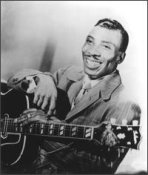 John Lee Hooker (1917-2001)
John Lee Hooker (1917-2001) John Lee Hooker was born August 22, 1917 County of Cohaoma, near Clarksdale, Mississippi. Eleventh child of sharecroppers (William Hooker, also a Baptist preacher, and Minnie Ramsey) plantation of the famous belt of cotton in the southern United States, the numerous children of the couple were allowed to listen only to religious songs. Little John, it was early influenced by the music of the spirituals he heard in the celebrations in the churches.
In 1921 his parents divorced and the next year John, with his mother remarried to William Moore, moved to Clarksdale. The new stepfather was a blues singer who gave him a guitar for the first training base. Hooker, later called Moore's guitar style as very personal and original, become major musical influences. Will Moore occasionally played with Charley Patton when it was playing near Clarksdale. Moore grew up in Louisiana and his style was different from that prevailing in the Delta: her songs were composed by a single, repetitive, hypnotic arrangement that went on stubbornly. Hooker has made this his way of playing the guitar, making it a sign of his unmistakable style. Blind Lemon Jefferson and Blind Blacke often went to Moore's house to play: they were deeply impressive performances for the little that Hooker began to make blues a matter of life.
John followed in the footsteps of his stepfather and began playing in various festivals of his country, until, after spending a decade in Cincinnati singing in various gospel choirs in 1943, driven by business needs, he emigrated to Michigan in the city of Detroit, where, working in an automobile factory, he took up residence 1969. He felt right at local gatherings of blues Hastings Street, the heart of black music and entertainment on the east side of Detroit. It was in this context that gave body to his vocation as a blues musician, with his unmistakable singing rural, raw and elegant at the same time, clocked by an inimitable boogie-vocal riff.
In 1948, Hooker's recording career began: the single Boogie Chillen, recorded in the recording studio near Wayne State University. Though he was illiterate, was a rather prolific lyricist: alongside the traditional topics of blues lyrics, built on recurring themes, he developed some of its production in an original and innovative, drawing on the tradition but at the same time proposing new texts.
The '60s were the final consecration at the white audience: the great glory was bestowed by the cover attached by several rock bands on the British scene, the result of his touring in 1963 in Great Britain.
1989 was the year the album The Healer, which joined with a number of musicians, including Keith Richards and Carlos Santana. The album won a prize Grammy award. The same period some recordings with Van Morrison (Never Get Out of These Blues Alive, The Healing Game, I Cover the Waterfront) and live appearances by the same artist, published live album A Night in San Francisco
In 2001, the disease, just before the European tour will soon after the death at the age of 83.
(Text taken from wikipedia.org)
 Do not speak italian? Read His biography on Wikipedia
Do not speak italian? Read His biography on Wikipedia  Tu ne parles pas anglais? Lis sa biographie sur Wikipedia
Tu ne parles pas anglais? Lis sa biographie sur Wikipedia  Italian ¿No hablas? on Lee biography en Wikipedia
Italian ¿No hablas? on Lee biography en Wikipedia 
Boom, Boom (2.5 MB - MP3)
One Bourbon, One Scotch, One Beer (3 MB - MP3)

Watch movies on YouTube





